Why NOT me? Happy Inclusive Post-Secondary Education (IPSE) Day!
May 1, 2024
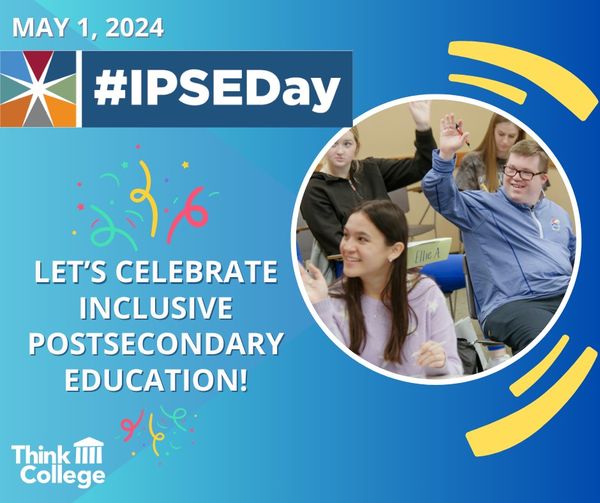
Guest author: Linda Cartwright
On April 27, a few days before Inclusive Postsecondary Education Day, I attended the graduation of the Career Independent Living and Learning Studies (CILLS) Program at East Stroudsburg University (ESU). Hopefully, you have heard about this program, as many of its alumni hail from Montgomery County and our own DSIG! My son, Steven, is a 2023 CILLS grad, and we joined the many participants honoring the men and women who received their certificates in this year’s beautiful ceremony. All ten are bright, amazing individuals. In addition to other wonderful characteristics, seven of the ten happen to have Down syndrome.
In her commencement address, Dr. Gina Scala, Chair of the ESU Special Education and Rehabilitation Departments, spoke about how CILLS, celebrating the 11th class of graduates, began. In the early 2010s, a high school boy with a disability asked his mother, “When am I going to college?” (as was his brother), and his mom answered, “You’re not.” His follow-up question, like The Judds’ song, “Why Not Me?” left her devoid of an answer. She approached the university, and after a several meetings with ESU faculty, the program was born. Since then, over 70 graduates’ lives and those of their families, university staff and faculty, community members, and thousands of ESU students have been forever changed by these individuals’ accomplishments and examples of Ability, tenacity, determination, kindness, acceptance, and zest-for-life spirit.
Our children want the same things that their peers want, and why wouldn’t they? Having Down syndrome does not alter their desires or expectations to have the experiences of their age group, that of their siblings, and their classmates. Sometimes it is our expectations that are lowered, partly due to society’s casting a shadow of doubt or outlook on our children’s skills or abilities, and sometimes, our own misconceptions. That, sadly, was my story.
The idea of college—and living away at college—was not an assumed post-secondary option for Steven, as it was for our younger son. We hadn’t started a college fund or a 529 account, like we did for Matthew. And shame on us! We had been working with Steven on preparing for what came next, types of careers, and possibly living independently someday. But it wasn’t until a year prior to exiting high school at age 21 that a representative from the Office of Vocational Rehabilitation (OVR) in his IEP meeting asked, “What type of job do you want when you leave high school?” He emphatically said, “I don’t need a job—I’m going to college!” And not just college—live away at college. My husband’s and my head spun around like Linda Blair’s in The Exorcist—”WHAT??” He never once mentioned wanting to attend college, even when it was brought up. But his goals had changed. He saw his brother, many of his classmates from his graduating class, and other friends head off to live a new phase, further their education, and have fun. Reluctantly, we helped him apply for admission, after being reassured by dear friends whose daughter was in the CILLS program. “WHAT, he’s been accepted??” We toured the campus and learned more about what his life as a college student would be like. Oh, and having waiver funding made tuition possible (much of it, considering the $35,000 cap.) “Okay, we’re really doing this—sending him away to school??” We did, and he did, and even survived college online during the pandemic. Suffice it say, it was the best decision we made for Steven (second to ignoring the prenatal, post-diagnosis suggestions by several medical professionals that termination was “still an option that should be considered.”)
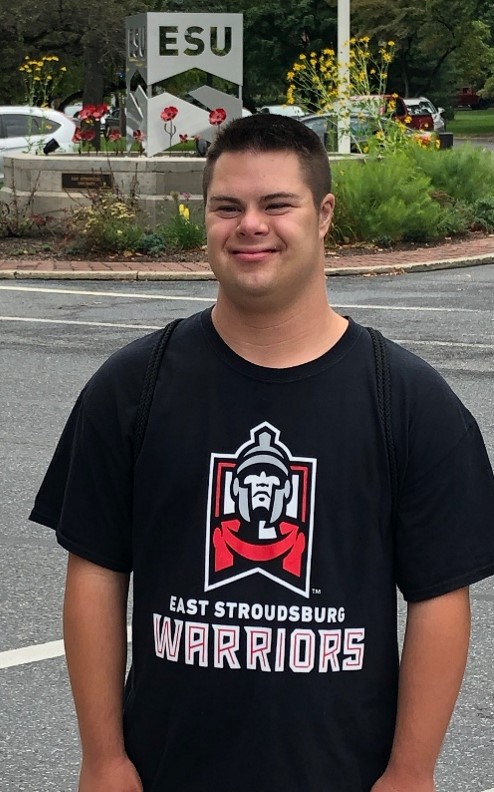
In my professional career as a Family Support Specialist at PaTTAN, I have been deeply involved in developing and supporting the grassroots organization, the Families to the MAX Statewide Network. The cornerstones of this dynamic group are presuming competence and holding high expectations—having the conviction that all individuals, despite any neurodivergence, can succeed at anything. Your mind automatically goes to, “Of course they can!” instead of, “I doubt” or “they’ll never” or “it’s highly unlikely” that they____(fill in the blank), that we all too often hear from those without these same beliefs.
The growth, maturity, and career possibilities a postsecondary education offers can sometimes be taken for granted. For individuals like “our kids,” this experience, historically, wasn’t a consideration, no less a reality. The opportunities that a trade or college program afford young adults, like Steven and these recent graduates, are insurmountable. In addition to a lifetime of memories and skills like self-awareness, -advocacy, -determination, and -confidence, consider how powerful it looks on a resume and what doors could be opened just with the connections made. Steven was invited to co-present with his program directors at the 2023 Pennsylvania Secondary Transition Conference. Other benefits include friendships, social interactions, coworker relationships, leadership opportunities, and mentoring with adult, same-age peers; participation in clubs, associations, sports, and activities typically connected with these type of institutions. Additionally, programs with on-campus residency teach navigating life outside of their families, e.g., grocery shopping, health maintenance, including hospital visits, time management (getting themselves to class, practice, church on time), and conquering being “homesick” as well as enjoying the freedom of living independently when they are “sick of home,” a typical 20-something phenomenon.
Secondary Transition planning in Pennsylvania schools is wonderful and provides many resources. Although three areas are discussed–independent living, post-secondary education, and employment–the process mainly focuses on competitive, integrated employment, which is needed and helpful. But don’t forget the other two. Employment should be everyone’s goal for adulthood and many, if not most, attain that in some fashion after some formal, continuing educational experience. Make sure, as your child reaches age 14 and even earlier, as is appropriate for them, that their IEP team, including them and you, earnestly deliberates a college, trade, or technical education and designs their IEP, secondary course selections, intramurals, club memberships, and guidance counseling to support that goal.
There is an ever-expanding body of programs for young adults who want to pursue a post-secondary educational experience. Only three other states currently have more programs than Pennsylvania’s 18. In our immediate area, schools like Gwynedd Mercy, Arcadia, Temple, West Chester, Widener, St. Joe’s, and others offer supported post-secondary education. Within less than a two-hour drive, East Stroudsburg and Millersville Universities offer programs with on-campus housing options, where your child has the opportunity to successfully live away at school, with oversight and safety provided by the programs, mentors, and at ESU, house managers who live with students (these are often students studying for careers in special education or rehabilitation, so—bonus—hands on experience to elevate their professional skills.) There are more options across the Commonwealth, including the technical institute at the Hiram G. Andrews Center, the PA College of Technology, and countless out-of-state options, such as The College of New Jersey. And believe me, your children come home more than you would think. They love being home but can’t wait to head back after a long break.
I highly encourage you to visit Think College!and The PA Higher Education Consortium for information about the possibilities.
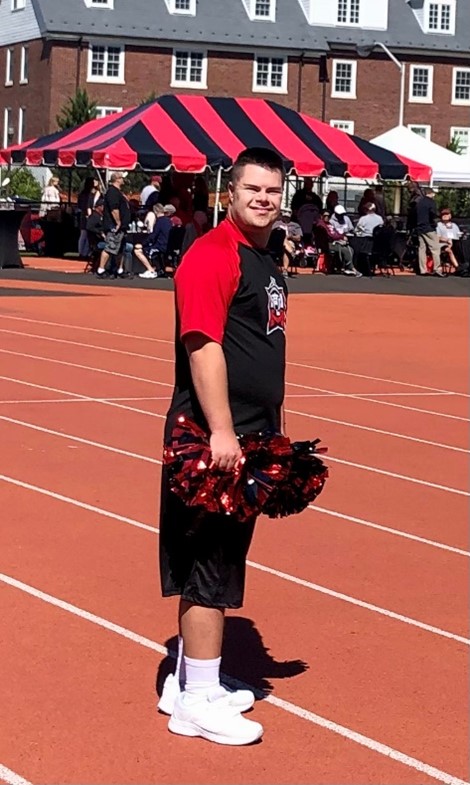
So, why not your child, your neighbor, or your student who is, or someday will be, planning for the transition from high school to the next big step in their life? Presume competence and teach the world around them to do the same. Anything is possible, and everything is possible!
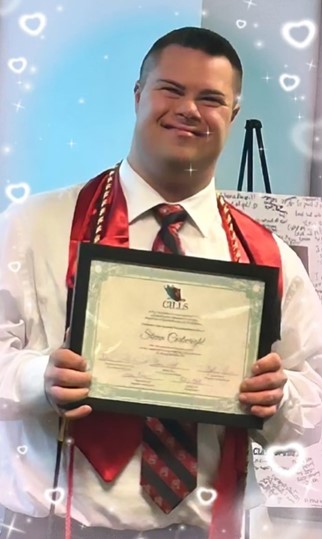
2021 Annual Report
It is with great pride that our Board presents our first-ever annual report highlighting all of the ways we brought together and supported our Village. We’re grateful for your involvement in MCDSIG and for the generosity of our donors who help make it possible for us to live out our mission. We invite you to read about all the great things that happened in 2021 and how we aim to move MCDSIG forward in 2022!
How Can Presumed Competence Change the Education Game?
Reprinted from ThinkCollege.net with permission from author and MCDSIG parent, Lizanne Magarity Pando, M.Ed
The rise of virtual learning during the global pandemic has impacted learners of this generation in a variety of ways. Virtual learning brought classrooms into homes where parents could observe their child’s educational process in ways they never had access to before. This sudden necessity and escalation of parent observation and involvement in their child’s learning process had its advantages and disadvantages. In my own continued educational process, I was in the midst of taking special education graduate classes at Cabrini University. In my coursework, I learned about how teachers’ perceived projections of what a student might learn in their class often dictated how the teacher would teach that student and what the outcomes might be for the student – for better or worse. Unexpectantly, I was living the rare experience as a parent, watching the evolution of diminished expectations of my daughter’s abilities.
My daughter Jenna is a 21-year-old student with Down syndrome. During the pandemic, Jenna was winding down her high school learning experience. The situation necessitated that she learn virtually at our kitchen table. It was illuminating to overhear her teachers and aide during her classes. There was a new level of transparency about their pedagogical approach. It often included telling her how she was doing something wrong rather than supporting her lessons with adaptations and celebrating her accomplishments. Their investment in her learning outcomes was dismal. This practice continued in every class for months. Many teachers never even met with Jenna or only met with her once from March to May. Jenna was supposed to rely on the aide to be her predominant teacher. The other teachers just sent worksheets and assignments.
Presumably, this was her experience for years and we were only fully exposed to us because of the pandemic’s demand for virtual learning. Our daughter developed low self-esteem about her learning abilities from this teaching approach. She would often “whisper” her answer thinking if it was not right she would be talked down to. It cast a shadow of doubt on our plans for her transition to higher education. What her high school was calling inclusion can be described by Kliewer (1998): because they (students with Down syndrome) are not truly welcome and do not truly belong, they (students with Down syndrome) are squatters in their own classroom. They are marginalized as second-class citizens.
Higher education options are ‘newer and fewer’ to students with Down syndrome. Though higher education has been accepting students with disabilities for 30 years, students with Down syndrome have only received the types of supports that made their entry to higher education possible and successful in the last 13 years. Jenna was accepted into East Stroudsburg University’s Career Independent Living and Learning Studies program (CILLS) to begin her studies in the fall semester of 2020. This program was in its ninth year at the time of Jenna starting college. As it turned out, she began her university experience at the same kitchen table where she finished her high school classes, learning virtually. Professors from many different programs and subjects taught these college classes. Her orientation was thorough, and they supported her with non-disabled students (peer mentors) to assist her learning, note taking, homework support, and overall transition to higher education.
The difference in style from dismal to presumed competence was enlightening and refreshing. Jenna was encouraged to participate and share with the class. The teachers began by talking to her with respect and clarifying the expectations for their class. She received adequate support and adaptations. Teachers showed up and taught their classes on Zoom. Their approach of presumed competence changed the entire learning process.
Her first semester ended with a report due in her Academic Learning Success class. This report was a to be a PowerPoint Presentation on stress and how that can affect learning. Jenna added three points and one photo per slide. The presentation was eight slides and she was expected to share her screen and personally present. She did all the work herself. Jenna chose to wear a dress and blazer. She presented many great points on how stress in college can affect learning. She had moved from answering in ‘whispers’ to a confident, happy, fully informed and articulated presentation, which she then uploaded to Dropbox for her grade. Additionally, in her film class, she was required to interview someone that was in the video production business. She did an excellent job developing the questions she would ask and using Premier Pro to edit her video. Her teacher was pleased. She also ran Bingo nights on Zoom for classmates to enjoy for social hour. Whereas Jenna experienced doubts and low self-confidence about her learning in high school, her college ‘Zoomed’ classroom experiences ignited in her a fire for learning.
This was a transformational experience. This kind of transformation takes time, because to transform, you must learn to trust and build the bridge to a mutually beneficial relationship. It does not happen overnight. Years of being told you cannot learn takes a toll on your outlook. Presumed competence set Jenna and her journey to independence in a different direction.
So, how can we increase higher education learning outcomes for students with disabilities if high schools are consistently presuming low outcomes for students with intellectual disabilities? Are teachers getting support from their administrations? Do they participate in professional development about how to teach to gain better outcomes? Who is responsible for this gap and failure in the process: the teachers, those who educate and support them, or both? How can we change this process to enhance everyone’s inclusion learning experience? The purpose of exposing students with intellectual disabilities to presumed competence is to provide them, for perhaps the first time in their lives, the expectation that they can learn after leaving high school and the opportunity to choose to learn. Due to high school’s nature and structure, students with intellectual disabilities are seldom provided the chance to choose what they want to learn about, nor are they given guidance about how to access knowledge as adults (Grigal, 2010).
Disability does not mean deficit. We are leaving talented learners behind and failing them as a system and as full participants of society. How can we do better so more high schools prepare students who learn differently for a college experience?
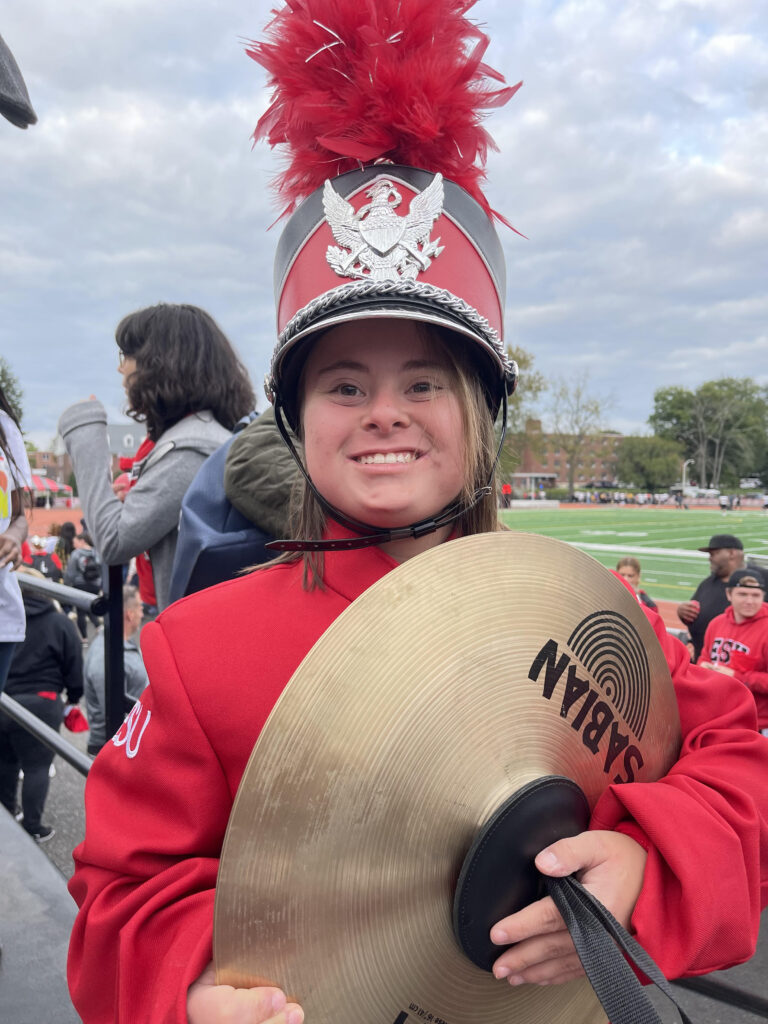

About the post author: Lizanne Magarity Pando, M.Ed is the President of St. Hubert Catholic High School for Girls. She is currently pursuing a doctorate at Cabrini University. Her daughter, Jenna, is a sophomore at East Stroudsburg University in the CILLS Integrated Services program. Jenna is a 22-year-old student with Down syndrome studying Early Childhood Development and Fitness with the career goal of becoming an Assistant Gym Teacher.